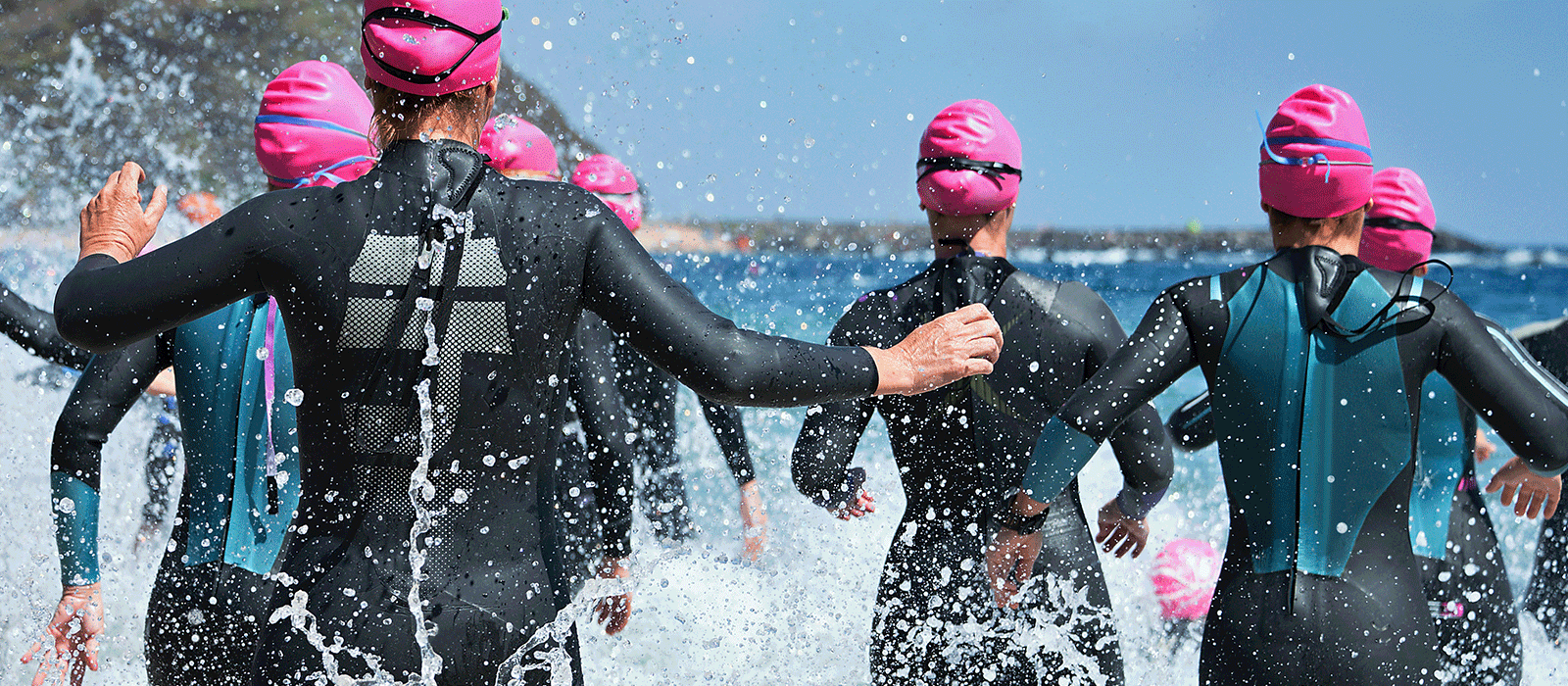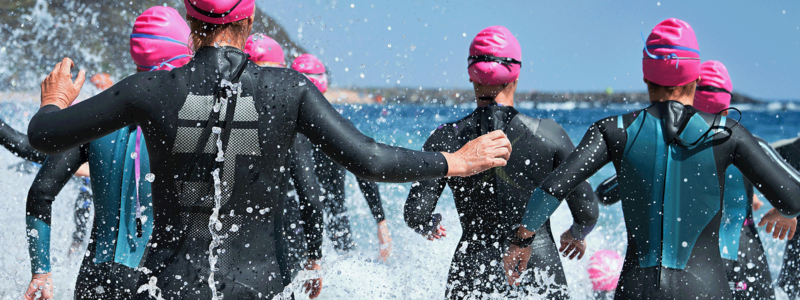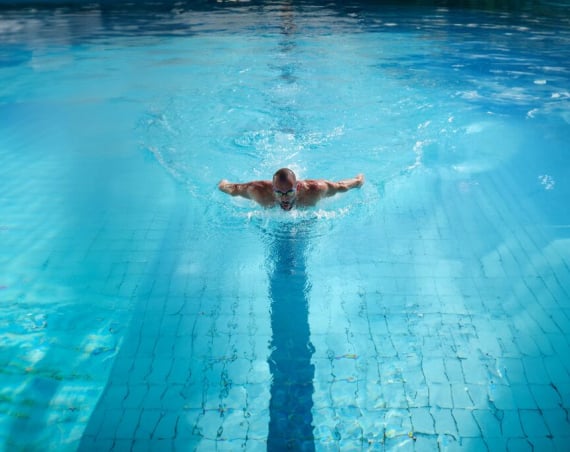Training for, and competing in, a triathlon is a huge challenge demanding time, effort and plenty of sacrifice. As a beginner with little or no experience, it can be scary not knowing what to expect or how best to prepare for the day. In this case, a little insider knowledge can go a long way, which is why we’ve asked a few seasoned David Lloyd Clubs competitors to share their experiences and advice…
James Rule
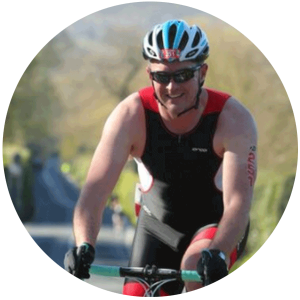 Age: 44
Age: 44
David Lloyd Club: Kings Hill Health Club
Triathlon level: I’ve been competing since 2008, and have taken part in a mixture ranging from local sprints, to international half Ironman’s.
Favourite Triathlon: Tonbridge
Next Triathlon: Tonbridge
Longest triathlon distance: Half Ironman (1.9km swim, 91km bike, 21km run)
Best time: Varies depending on the distance. I’m looking to go sub 85 minutes in Tonbridge
Favourite stage: Cycle
What made you decide to compete in triathlons?
I was looking for a new challenge after long distance cycle races. Marathons didn’t appeal to me, but the shorter distance and variation in triathlon did. That being said, in two years I went from a sprint distance (usually around 90 minutes of effort), to half Ironman (around 6 hours) inside four years!
How do you go about picking a triathlon distance?
The longer the distance, the more long-distance training you’ll need to do. In reality it depends on how much time you can devote to training. As a Master Sports NLP Coach (Sports Psychology), I am very aware of how mindset affects performance. The longer the triathlon, the harder the demands on your body and mind, is a good rule of thumb!
How much swimming, cycling or running had you done before you decided to compete in triathlons?
I swam as a child and I road cycled more recently. To bring my swimming up to speed, I worked with a coach.
What is your top tip for race day?
Only you know if you have trained enough, and you’re unlikely to improve fitness in the week before, so spend that week tapering down. The night before, ensure you’ve prepped your race box and have everything you need. You’ll do wonders for your psychology and mindset if you can get up, stay relaxed, and feel confident that you have everything you need to achieve your goal.
What is your best advice for the swimming stage?
Practice before the race getting in the pool and starting within seconds. Swim smooth and avoid the temptation to go off like a rocket. My other tip is to wet your face and goggles before you put them on. If it’s an outside swim wear two hats: one hat on, then goggles, and then the second hat on over that. It will prevent your goggles coming off if you bump into someone!
What is your best advice for the cycling stage?
Make sure your bike is working properly before the race: gear changes, tyre pressure, brakes adjusted correctly etc. Technique wise, learn the skills to descend quickly and use them. Also when you get to the top of a hill, push on as quickly as you can and take active recovery. You’ll be amazed how many people you pass if you do all three of these things!
What is your best advice for the running stage?
Negative splits! In other words, run the second half faster than the first half. Some people are tempted with sprint finishes but I’m not so sure as your body is under enough strain as it is. All your efforts have come to fruition and you’ve completed this triathlon – so enjoy it!
What would you say your strongest stage is, and why?
The cycle stage. I ride out with my mates from David Lloyd Kings Hill all the time. Sometimes it’s race pace, sometimes it’s more leisurely. I also like going fast and there’s nothing quite like self propelled speed!
How do you structure your training for a triathlon?
It’s relative to the distance. Saving 10 seconds in your swim over 90 minutes is not a great return, if you could train more for the cycle and run and save minutes. You do have to train for all three and you’ll know where you’re strongest. I know few people who enjoy endless laps of a pool, so that’s the one that does get neglected (me included!).
I also like to think about mindset. Resilience, confidence, focus and even how to reframe negative experiences can be learnt and grown from. I’m finding that the very top athletes are all paying more attention to their mind. I like to say “train your mind like you train your body”.
What is your favourite moment from a past triathlon?
Completing the Antwerp Half Ironman, busting into tears, and then having a funny sugar bomb moment after eating two Belgian Waffles!
How do you motivate yourself when you are struggling with training, and also on race day?
I’m a sports performance/psychology coach so I’ve taught myself many techniques that keep my mindset where it needs to be. I help others as well so your readers could get in touch if they wanted to know more. There’s a whole host of things from getting into the zone, grip techniques, arousal dial control, all the way through to fear and phobia management.
What is the best piece of advice you can give about competing in a triathlon?
I would suggest using online forums, getting involved with local triathlon clubs and more importantly talking to your friends who have already done one. You’ll find the triathlon fraternity a friendly one!
Here is James and his fellow David Lloyd Kings Hill triathlon group members enjoying the day with their families. Well done team!
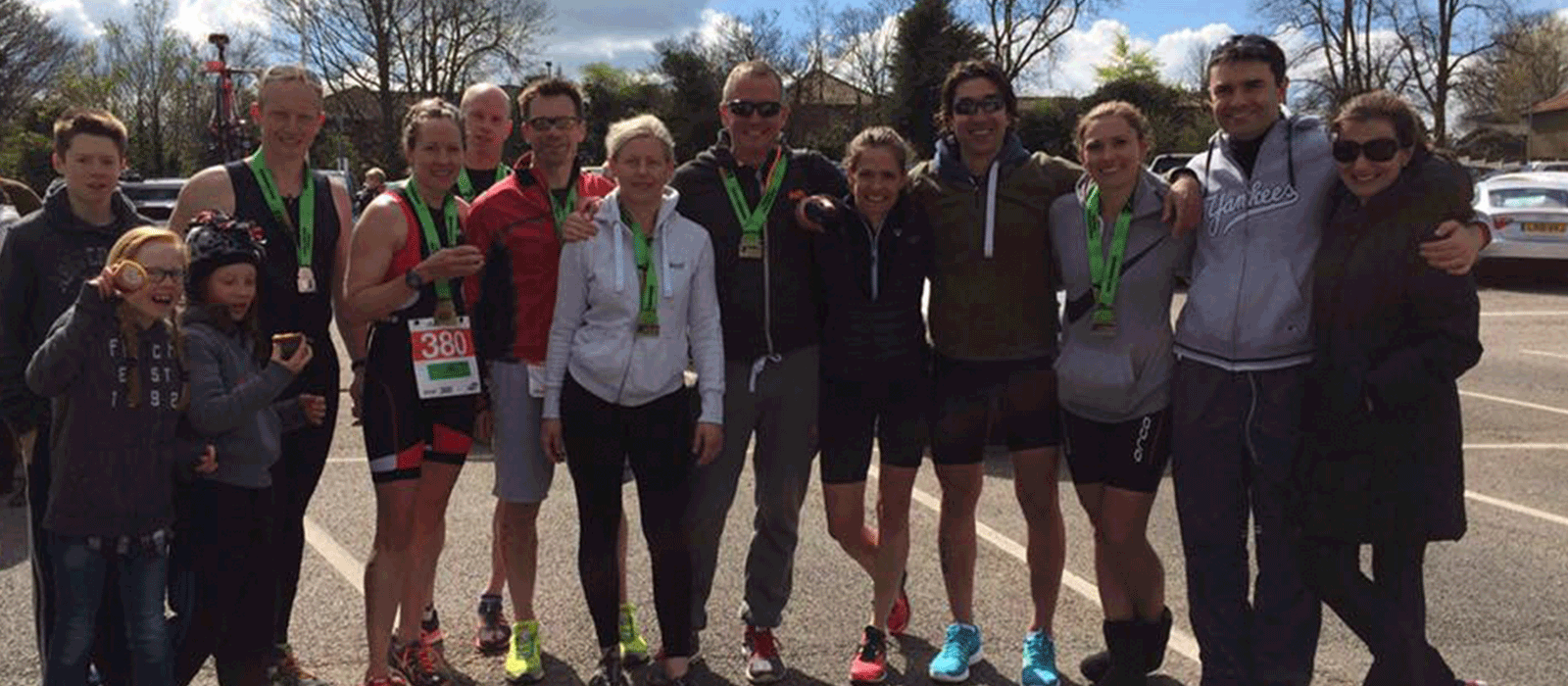
Michael Cronin
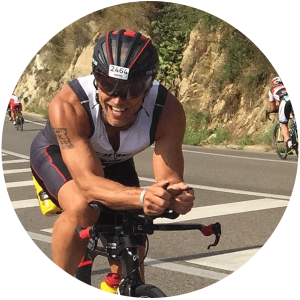
Age: 52
David Lloyd Club: Beaconsfield Health Club
Triathlon level: Iron-man
Favourite Triathlon: Barcelona Ironman
Next Triathlon: UK 70.3 Ironman Staffordshire
Longest triathlon distance: Ironman
Best time: 10 hours 58 minutes
Favourite stage: Cycle
What made you decide to compete in triathlons?
I’ve been always been sporty and wanted a goal on my retirement day in July 2013. I entered a Half Ironman and completed it on my retirement day.
How do you go about picking a triathlon distance?
I started with Sprints and worked my way up. I’ve found that I’m better at endurance than sprinting.
How much swimming, cycling or running had you done before you decided to compete in triathlons? I had done virtually no swimming, some general cycling and an occasional run.
What is your top tip for race day?
My top tip would be to be consistent – think of it as one race, not three separate ones.
What is your best advice for the swimming stage?
Start slowly and build into the swim.
What is your best advice for the cycling stage?
My best advice for this stage would be to take on nutrition regularly on the long distance races. I find setting alarms to eat and drink at specific times works well for me.
What is your best advice for the running stage?
To be comfortable at the pace you’re going. Trust your training, and stick at your planned speed. Don’t get carried away with the crowds and adrenaline or you will blow up!
What would you say your strongest stage is, and why?
Cycling is my strongest stage as I can hold a good pace of around 35KMP for 5-6 hours.
How do you structure your training for a triathlon?
I mix it up to keep it varied – speed one set, distance the next, endurance, Fartlek etc. Don’t let your body get comfortable with something. I practice hurting in training, because you will during a race!
What is your favourite moment from a past triathlon?
Finishing my first full Ironman in Mallorca. 140 hot hilly miles at 51yrs of age. That was a proud moment!
How do you motivate yourself when you are struggling with training, and also on race day?
I’m lucky in that I always want to better myself. It’s all about getting the most from my body. Race day is about getting the time your training has prepared you for, without mistakes. It’s what you deserve.
What is the best piece of advice you can give about competing in a triathlon? Preparation is everything. Train hard and put the hard yards it – a long distance triathlon isn’t something you can wing.
What are you most proud of in your triathlon competing history?
I am most proud of going sub 11hrs in Barcelona Ironman. I hadn’t been able to run for six weeks leading up to the event, because of injury. So, I swam hard and smashed the bike, and then went through so much pain on the run, but managed to limp a 4.20 marathon. I finished in under 11 hours!
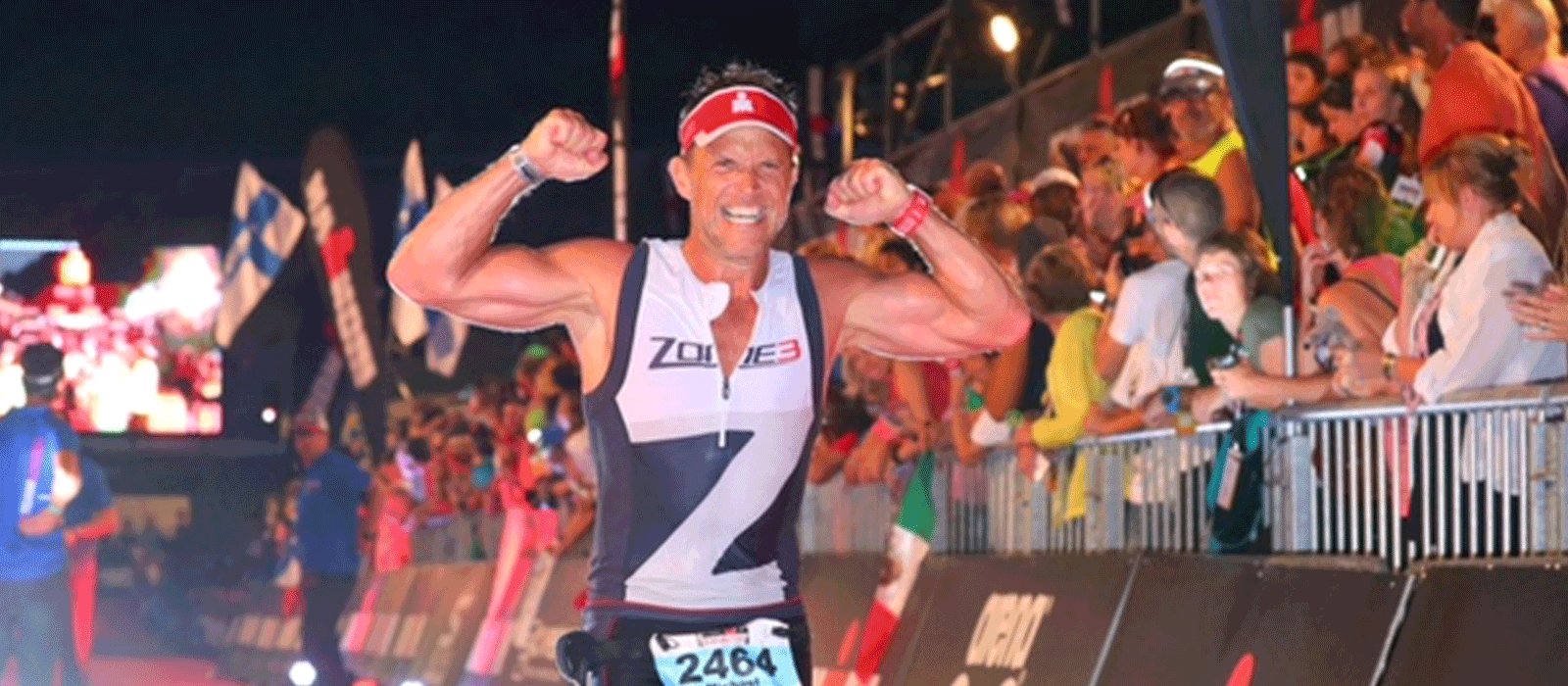
Craig Norris
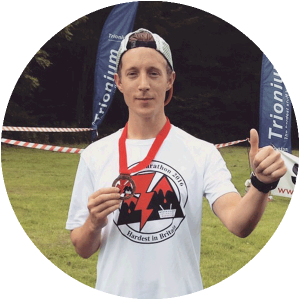
Age: 35
Triathlon level: Iron-man
Favourite Triathlon: Ironman Wales
Next Triathlon: I quite fancy the Norseman
Longest triathlon distance: Ironman
Best time: 11 hours 49 minutes
Favourite stage: Run
What made you decide to compete in a triathlon?
I was flicking through a magazine one day – must have been back in 2010 – when I came across an interview with a Chrissie Wellington. It read that she was a champion at something referred to as Ironman triathlon. My brain couldn’t quite compute the distance of the event – “and then you run a full marathon… huh?”. Soon after, I was in the pool teaching myself to swim.
How did you go about picking a triathlon distance?
It was only ever going to be Ironman distance after that. I entered a couple of Olympic distance events beforehand to practice transitions.
Had you done any swimming, cycling or running before deciding to compete in a triathlon?
I could swim and cycle but not to any real standard. I certainly couldn’t swim continuous lengths in the pool. I spent a couple of years regularly swimming, watching YouTube tutorials and entering some open water events. With the cycling, it was pretty much blagged; though the running had given me some strong legs to start.
If you’ve competed in a triathlon before, what is your top tip for the day?
Around you on the day will be aero-helmets, disc wheels and Ironman tattoos. Keep the faith and know that you will get through the paddling, pedaling and plodding, however simple your kit!
Do you have any tips for the swimming stage?
Don’t panic. Whilst you may feel as if all around you are chatty and jovial, rest assured everyone is nervous. Unless you’re looking to compete for the podium, your aim should be to get through it in one piece. Don’t get caught up at the front, and take a wide turn at the buoys.
Do you have any tips for the cycling stage?
The bike leg is the one leg where you are counting on more than just your body to hold together. There are many things that can go wrong on the bike, most of which can be limited and overcome with a thorough bike check beforehand, and the knowledge and confidence to repair minor malfunctions on the day. Just having the peace of mind that you can change a tyre will make you feel a lot calmer!
Do you have any tips for the running stage?
When you leave T2 your legs will feel like lead. Rest assured this will dissipate. Concentrate on the quality of your stride rather than the pace of it to ease yourself in.
What would you say your strongest stage is and why?
As a runner first and foremost, the run leg undoubtedly is my strongest. It’s also fortunate that it’s the final discipline; so having the confidence to complete a marathon is reassuring.
How do you structure your training for a triathlon?
The logistics behind training for triathlon are vast. It’s not merely the time spent exercising itself, but also the setup of equipment, the to-and-fro of hitting the pool, and all the researching and planning involved. Therefore it pays to combine disciplines in training, be it running off the bike or running to the pool. I aim to run commute each day, some days via the pool. The vast majority of my cycling is then done on a turbo trainer in the evening, or at weekends.
What is your favourite moment from a past triathlon?
That first time you enter the red carpet of an Ironman is rather special. An Ironman marathon is run on a looped course – where competitors collect coloured armbands on each one – so the crowds are well aware when you’re ‘heading home’. Those last few miles are electric and this escalates further when you turn off for the finish line!
 Craig has written a post about his first Ironman and also features in our marathon series. Check them out and follow him on Instagram.
Craig has written a post about his first Ironman and also features in our marathon series. Check them out and follow him on Instagram.
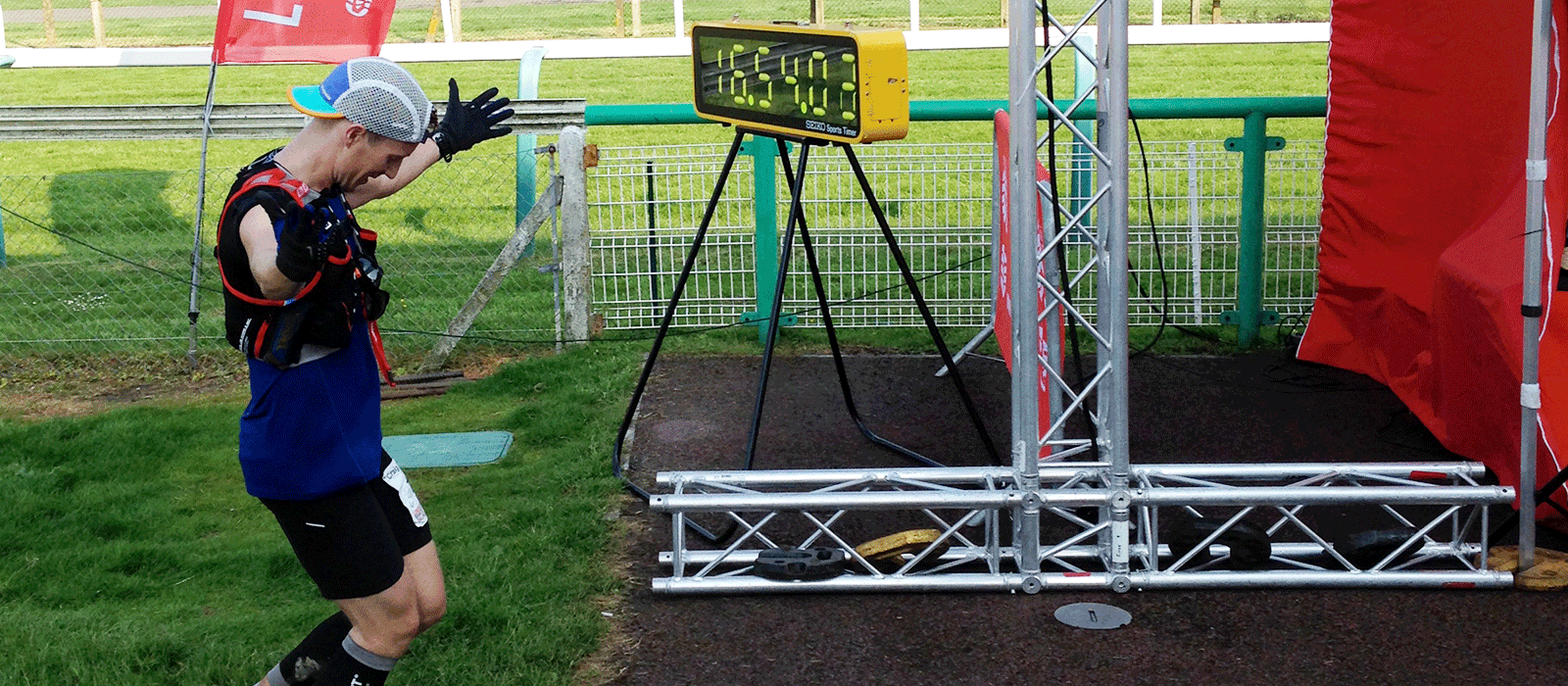
Jen Lande
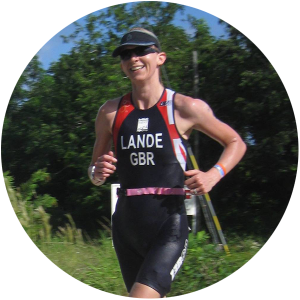 Age: 40
Age: 40
David Lloyd Club: Beaconsfield Health Club
Triathlon level: Seasoned! Age-grouper
Favourite Triathlon: Windsor Triathlon
Next Triathlon: Southport sprint distance
Longest triathlon distance: Half Ironman (70.3)
Best time: About 1hr 13mins for sprint and 2hr 20mins for standard
Favourite stage: I love and hate them all at some point, but the run is probably my favourite as it’s last!
What made you decide to compete in triathlons?
I was looking for a new challenge after completing the London Marathon in 2001. I wasn’t really into sport before that. I had some friends who were getting into triathlon and doing the London Tri – so I decided to train to do that in 2002. I found it very hard, but I loved the variety in training and was hooked from that!
How do you go about picking a triathlon distance?
I stick to sprint distance and standard distance. I like sprint because it’s hard work, very fast and hurts a lot, but it’s over quickly! I probably prefer standard distance though, because there is more room for pacing and tactics during the race. There might also be more room to make mistakes! Anything longer and the training is too much and it takes too long to recover – which isn’t great if you also have three young children to look after!
How much swimming, cycling or running had you done before you decided to compete in triathlons?
I wasn’t very sporty as a child, I was the one picked last for rounders and I didn’t really like PE at school. I was probably quite unhealthy as a teenager, going out having fun all the time! I started running when I was 22 on the 2nd January 2000 (a New Year’s resolution!). I worked in London at the time and ran with my friends at lunchtime up and down the Thames.
I’ve been swimming since I was young but not competitively – my Dad taught me front crawl. I’m probably a naturally good swimmer with a pretty good technique and body shape for swimming, so I didn’t find it too hard to catch up with everyone else and become better for triathlon.
The only cycling I did was to and from work and lots of spinning classes. I didn’t have a road bike until 2014, and all the triathlons I did were on a hybrid bike with straight handlebars. My friend taught me how to ride a bike properly in 2014 and got me back into triathlons after having kids. I was very bad at cycling before then!
What is your top tip for the triathlon day?
Definitely to enjoy the whole experience, meet new people, have fun travelling to the event and learning new aspects about triathlon. There is always something new to learn. Try not to get nervous as it’s a very friendly sport!
What is your best advice for the swimming stage?
Definitely practice in open water first! Start near one side or the other if you are nervous about swimming with a large group. If you breathe to only one side then start on the opposite side (i.e. if you breathe to the right like me, then try and start on the left) because then you can see where everyone is. I don’t sprint at the start and prefer to pace the whole thing and get faster towards the end, but that’s an individual thing.
Another top tip is to ‘sight’ more than you think you need to! I tend to sight every six strokes. This is lifting your head slightly out of the water to check where the next marker buoy is. Otherwise you’ll waste lots of time going off course.
What is your best advice for the cycling stage?
Get a bike fit from someone experienced in triathlon so that you are in the best position to cycle and to run off the bike. Practice running after cycling (brick sessions) so you know what it’s like to run with jelly legs! Don’t push too high with your gear as your legs will be too tired to run. In triathlon you are not allowed to draft (cycle right behind someone) so definitely don’t do that.
What is your best advice for the running stage?
Invest in some elastic laces so that you can get your trainers on really quickly after the bike. Don’t put socks on for anything shorter than half-ironman. Try not to run off too hard after the bike so that you can run a negative split (running the second half of the race quicker than the first). And, reserve some energy to outspent competitors at the end!
What would you say your strongest stage is, and why?
Swimming. I do a fair bit of open water swimming practice in the spring and summer. Over the years I’ve got much better at getting a good line between the buoys and staying on track, which means I don’t swim any more distance than I need to! I’m usually in the top ten out of the water.
How do you structure your training for a triathlon?
I try to follow a periodised training plan on a four-week basis, I train hard for three weeks and then have an easier week. It also means tapering for important races and taking things a bit easier in the off-season. I use Joe Friel’s books and his advice on Training Peaks. Week to week I aim to do three swims, four runs (including brick sessions) and four sessions on the bike. I should also do strength training but I’m not very good at keeping to that!
What is your favourite moment from a past triathlon?
My favourite moment probably has to be competing in my first World Triathlon Championships in Chicago in 2015. It was hot day and a hard race, but things generally went well and I met some amazing friends who I see a fair bit on the triathlon circuit. I was 6th in the aquathlon and 22nd in the sprint distance triathlon in my age-group (35-39).
How do you motivate yourself when you are struggling with training, and also on race day?
I don’t usually struggle with motivation to be honest – I like the routine and structure of training every day and meeting my friends in the gym. I have a training partner who makes me work hard even when I don’t want to! I have ‘lost my mojo’ on occasion and I usually try and focus on the end result, how I will feel after the race is over or the training session is over – I know I will usually feel better afterwards than if I did nothing. If all else fails I think about coffee and cake and that always works!
What is the best piece of advice you can give about competing in a triathlon?
The best piece of advice I can give is not to get caught up in all the many intricacies of triathlon so that you lose sight of the bigger picture. It really is just about training hard and to the best of your ability and putting that into practice on race day. I keep a list of the things I have done in the past that have gone well and do them again every race, but they are not too complicated. I’ve also got a list of everything I need to take for race day.
Enjoy everything about race day – travelling and seeing new places, meeting new people and making mistakes. By the time race day comes you’ve done all you can, so it’s all about keeping your head together on the day. It’s a huge learning curve and that’s what makes it so much fun!
What are you most proud of in your triathlon competing history?
I’m proud of competing for Great Britain and wearing the GB trisuit with my name on it!
We wish James, Michael, Craig, Jen and anyone competing in a triathlon this year the very best of luck, and a huge well done on their achievements so far.
